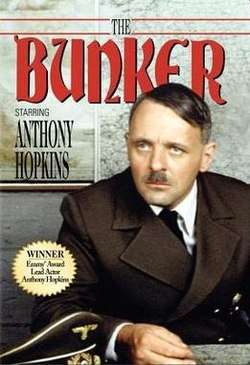The Bunker (1981 film)
The Bunker is a 1981 American made-for-television historical war film produced by Time-Life Productions based on the 1975 book The Bunker by James P. O'Donnell.[1]
| The Bunker | |
|---|---|
 | |
| Based on | The Bunker by James P. O'Donnell |
| Written by | John Gay |
| Directed by | George Schaefer |
| Starring | |
| Music by | Brad Fiedel |
| Country of origin | United States |
| Original language(s) | English |
| Production | |
| Executive producer(s) | Bernard Sofronski |
| Producer(s) |
|
| Cinematography | Jean-Louis Picavet |
| Editor(s) | Greyfox |
| Running time | 154 minutes |
| Production company(s) | Time-Life Productions |
| Distributor | Warner Bros. Television Distribution |
| Release | |
| Original network | CBS |
| Original release | January 27, 1981 |
The film, directed by George Schaefer and adapted for the screen by John Gay, is a dramatisation depicting the events surrounding Adolf Hitler's last weeks in and around his underground bunker in Berlin before and during the Battle of Berlin. The film stars Anthony Hopkins as Hitler, plus an all star cast including Richard Jordan, Susan Blakely, and Cliff Gorman.
Plot
The film opens in 1945, with O'Donnell (James Naughton) gaining entry to the Führerbunker by bribing a Soviet sentry with a packet of cigarettes. It is followed by the film's moving to flashbacks to the months between January and May 1945 as Hitler and those in the bunker faced their last days and nights.
The actors' interpretations of the events differ in ways from the traditional accounts. For example, during the final meeting between Hitler and Albert Speer, Hopkins adopts a sarcastic tone and gestures (including mock applause) that suggest that Hitler was already aware of Speer's betrayal, even though he uses the exact words recounted by the witnesses. This became a fairly controversial scene due to a perception in some circles that the resemblance to Jesus Christ's legendary foreseeing of Judas's betrayal was intentional. These accusations were consistently denied, as were reports regarding a rumoured on-set romance between Piper Laurie (Magda Goebbels) and Cliff Gorman (Joseph Goebbels).
Also, the film constantly shifts the point-of-view character. This includes characters who are not known to have left their experiences on record. For example, Dr. Werner Haase is used in this manner, even though he was never interviewed (having died in late 1950). Likewise, two scenes are written from the viewpoint of Hitler's cook, Constanze Manziarly, and in one scene, Manziarly actually has a flashback, remembering happier days. However, Manziarly disappeared while escaping from the bunker, so neither O'Donnell nor any other person was able to interview her or get her viewpoint.
Given O'Donnell's work on the breakout, the film ends just as the groups are leaving the bunker complex of the Reich Chancellery.
Cast
- Anthony Hopkins as Adolf Hitler
- Richard Jordan as Albert Speer
- Cliff Gorman as Joseph Goebbels
- James Naughton as James P. O'Donnell
- Michel Lonsdale as Martin Bormann
- Piper Laurie as Magda Goebbels
- Susan Blakely as Eva Braun
- Martin Jarvis as Johannes Hentschel
- Michael Kitchen as Rochus Misch
- Robert Austin as Walter Wagner
- Andrew Ray as Otto Günsche
- Yves Brainville as Heinz Guderian
- Michael Culver as Wilhelm Mohnke
- Julian Fellowes as Nicolaus von Below
- Frank Gatliff as Ernst-Günther Schenck
- David Swift as Johann Rattenhuber
- Terrence Hardiman as Hermann Fegelein
- Edward Hardwicke as Dieter Stahl
- Karl Held as Hans Baur
- David King as Hermann Göring
- Sarah Marshall as Traudl Junge
- John Paul as Wilhelm Keitel
- Morris Perry as Werner Haase
- Pam St. Clement as Constanze Manziarly
- John Sharp as Theodor Morell
- Michael Sheard as Heinrich Himmler
- Tony Steedman as Alfred Jodl
- Peggy Frankston as Margarete Speer
In a short scene at the beginning of the film, a younger O'Donnell is played by actor James Naughton. O'Donnell himself provided brief voice-over narrations at the beginning and end of the film.
Anthony Hopkins won an Emmy for his portrayal of Adolf Hitler. Actors on the set claimed his performance was so convincing that those playing German soldiers snapped to attention whenever Hopkins came onto the set, even if he wasn't in character.
Actors Michael Sheard (Himmler) and Tony Steedman (Jodl) reprised their characters from the 1973 British television film The Death of Adolf Hitler.
Awards
Won:
- Primetime Emmy Award for Outstanding Lead Actor in a Miniseries or a Movie: Anthony Hopkins
Nominated:
- Primetime Emmy Award for Outstanding Supporting Actress in a Miniseries or a Movie: Piper Laurie
- Primetime Emmy Award for Outstanding Sound Editing for a Miniseries, Movie or a Special
- René Magnol (production mixer)
- Robert L. Harman (re-recording mixer)
- William L. McCaughey (re-recording mixer)
- Howard S. Wollman (re-recording mixer)
See also
Downfall, 2004 film
References
- J. O'Connor, John (January 27, 1981). "TV: 'Bunker,' On Hitler's Last Days". The New York Times.
External links
- The Bunker on IMDb